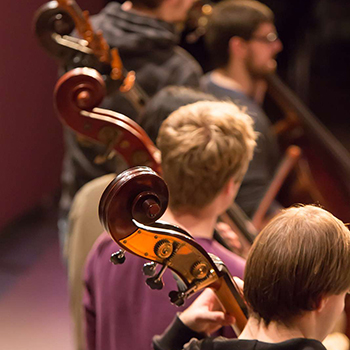Careers
- arts administrator
- composer
- conductor
- educator
- performer
- musicologist
- sound engineer
- teacher/educator
Alumni have successfully pursued law, medicine, business, music therapy and community music.
Search for academic programs, residence, tours and events and more.
At Laurier, you’ll experience the best of both worlds: the intimacy of a small school where you won't get lost in the crowd and the resources of a larger institution. Our state-of-the-art facilities offer the ideal environment for both studying and practicing, while our dedicated faculty will push you to achieve beyond your expectations. The Waterloo region is a vibrant hub for music, featuring renowned groups and venues like the Kitchener-Waterloo Chamber Music Society, Jazz Room, and a steady stream of guest artists visiting Laurier.
Laurier's world-class program competes with those at larger institutions, yet maintains a close-knit, personal atmosphere. Similarly, the KW area blends the charm of a small town with the amenities of a big city, all within an incredibly dynamic arts scene.
In our bass studio, the intimate setting fosters meaningful interaction between students and faculty, creating a collaborative learning environment. Our faculty, experienced in both European and North American bass traditions, bring diverse expertise and proficiency in all bow grips to support your growth.

Admission to the Bachelor of Music is determined by a holistic review of your audition, academic transcript, interview, reference and optional portfolio.
You can find the double bass audition requirements here.
Free lessons with a faculty member are available to all applicants, and you can choose to schedule one before the audition to work on repertoire and calm nerves. The audition panel will be friendly, but we understand that playing in such a situation can still be stressful.
We'd recommend listening to many recordings of the repertoire, even on different instruments, to get a good sense of how the piece should sound. While memorization is not required, it's a good idea to be very familiar with the piece you choose to perform.
If possible, rehearse your sonata with a pianist before the audition to feel secure with the accompaniment.
Create "mock auditions" to simulate the audition day and invite your friends, teachers, and family member to listen to you play the repertoire. Try using a larger room for your mock audition to replicate performing in a similar space to where auditions will be held. Don't hesitate to contact the audition coordinator with any questions well in advance of your audition.